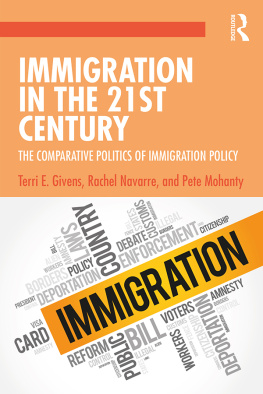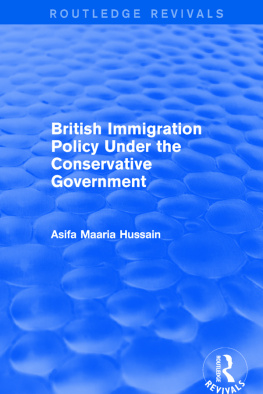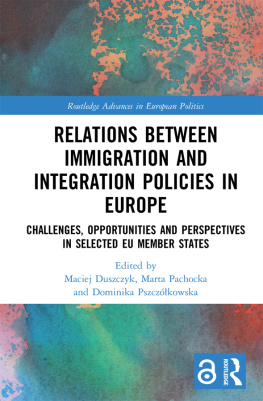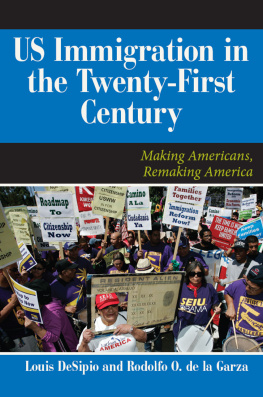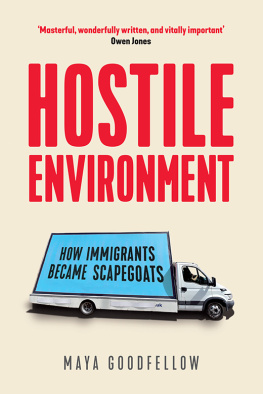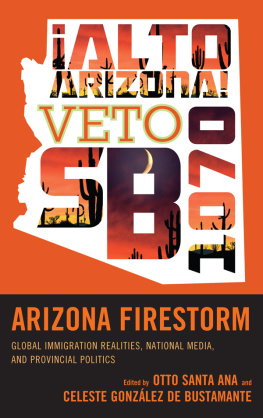Copyright Hannah Jones, Yasmin Gunaratnam, Gargi Bhattacharyya, William Davies, Sukhwant Dhaliwal, Kirsten Forkert, Emma Jackson and Roiyah Saltus 2017
The rights of Hannah Jones, Yasmin Gunaratnam, Gargi Bhattacharyya, William Davies, Sukhwant Dhaliwal, Kirsten Forkert, Emma Jackson and Roiyah Saltus to be identified as the authors of this work have been asserted by them in accordance with the Copyright, Designs and Patents Act 1988.
Published by Manchester University Press
Altrincham Street, Manchester M1 7JA
www.manchesteruniversitypress.co.uk
British Library Cataloguing-in-Publication Data
A catalogue record for this book is available from the British Library
Library of Congress Cataloging-in-Publication Data applied for
ISBN978 1 5261 1321 4hardback
ISBN978 1 5261 1322 1paperback
ISBN978 1 5261 1794 6open access
First published 2017
An electronic version of this book is also available under a Creative Commons (CC-BY-NC-ND) licence
The publisher has no responsibility for the persistence or accuracy of URLs for any external or third-party internet websites referred to in this book, and does not guarantee that any content on such websites is, or will remain, accurate or appropriate.
Typeset
by Toppan Best-set Premedia Limited
Emma Jackson is a Lecturer in Sociology at Goldsmiths, University of London
For me, getting involved in the Mapping Immigration Controversy project was a practical response to the challenge Hannah posed on Twitter when we were discussing the Go Home vans which was (paraphrasing) there must be something we can do other than talk amongst ourselves? Sitting in Glasgow, where I was working at the time, I was watching the van campaign and the intensified raids in London from a distance, feeling far away and powerless to do anything helpful. Then the intervention in the UK Border Agency Glasgow offices sparked protest in my new city. So, I was motivated by anger and the urge to do something but I also thought these campaigns raised important sociological questions about the place of border control and the use of emotion in governance.
A lot of what I do is about researching questions of belonging, spatial practices and how these are shaped or intersect with forms of power in urban contexts. In this project I've been particularly interested in how anti-immigration interventions feed into the production of particular spaces and places. It also relates to the work I have done with Hannah on emotion and location for our edited book Stories of Cosmopolitan Belonging: Emotion and Location (Routledge/Earthscan, 2014).
Gargi Bhattacharyya is a Professor of Sociology at the University of East London and co-director of the Centre for Migration, Refugees and Belonging
I met most of the other people on this project at an event that I organised on scholarship and activism against racism at the University of East London in July 2013. Out of this network, we organised a street survey to challenge the racist common sense of immigration checks in public spaces I think because of this, I was invited to join the Mapping Immigration Controversy team. I have been so, so pleased to work collaboratively on these urgent issues with this wonderful group.
Hannah Jones is an Associate Professor in Sociology at the University of Warwick
I had been angry for a long time about the unfairness of migration control and public debate, but the Go Home van was a trigger for more concerted action. Inspired by the space Gargi had created at a workshop some weeks previously, at which we discussed how social research could be a tool for social justice, it seemed like the horrible moment of the Home Office campaigns could be used to galvanise us to use our research skills to try to shift these debates in some way. The coming together of a group of people who wanted to try out similar things was what made this happen.
In the past, I worked in local government policy and wrote my PhD about the ways that policy practitioners operate in what might be termed postpolitical environments. This meant that one element of the project that was especially important to me was our attempt to understand how the people behind initiatives like the Go Home van understood them rather than simply imagining the Home Office as a monolithic villain. More generally, my research interests in everyday racisms and multiculture, and in power and emotion, ran through the central concerns of the project as did my interest, shared with the rest of the team, in paying critical attention to research methods as a form of knowledge production which is too often under-discussed.
Kirsten Forkert is a Senior Lecturer in the School of Media at Birmingham City University
I became involved in the project through the work I was doing with Action Against Racism and Xenophobia (AARX), where I carried out street surveys in Birmingham together with Gargi Bhattacharyya. I was concerned at the increasingly strident anti-immigration rhetoric from both the government and the media. As a non-European citizen and a racially minoritised person, I also found myself the object of both immigration legislation and anti-immigration rhetoric.
My involvement follows on some campaigning and writing I had done around the situation facing international students in the UK, about which a chapter is published in The Assault on Universities (Bailey and Freeman (eds), Pluto, 2011).
Roiyah Saltus is a Principal Research Fellow in the Faculty of Life Sciences and Education at the University of South Wales
I also attended the conference hosted by Gargi at the University of East London and became involved in the online outcry about the Go Home campaign. I was keen to explore the impact that the campaign, and the increasingly tough anti-immigration stance of the UK government, was having in Wales. As a female Caribbean migrant, I am part of they.
Sukhwant Dhaliwal is a Research Fellow in the Institute for Applied Social Research, University of Bedfordshire
I felt frustrated by the mainstream discussion of immigration, the sense that an anti-immigrant position had become an undisputed norm across the media and main political parties. I wanted to be part of a research project that could poke holes in this newfound common sense by bringing anti-racist research to bear, especially giving voice to local people who are being impacted by immigration policies. I also felt motivated by the research team, their political orientation and their mode of working, particularly their commitment to working collaboratively with civil society organisations.
I moved to academia after working for ten years in the voluntary sector, notably for feminist organisations challenging violence against women and girls. This project connects with my overall focus on equalities and discrimination. My experience in the voluntary sector in Britain has been complemented by an academic career that encompasses research projects on five out of six of the equality strands race, gender, disability, age, religion and belief including research projects about racial harassment in the public housing sector, racism and trade unionism, the intersection of race and disability in meeting the housing needs of Black disabled people, the work experiences of older men and older women, the impact on women of religious fundamentalism, and the impact of religious mobilisations on relations between the state and civil society.


